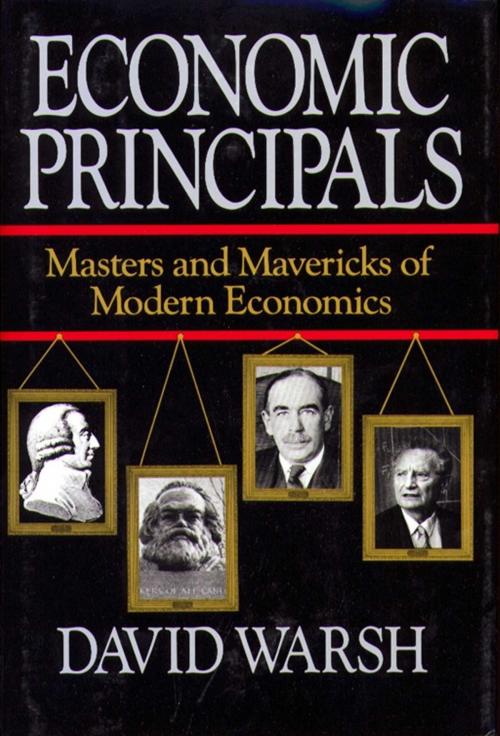| Author: | David Warsh | ISBN: | 9781451602562 |
| Publisher: | Free Press | Publication: | June 15, 2010 |
| Imprint: | Free Press | Language: | English |
| Author: | David Warsh |
| ISBN: | 9781451602562 |
| Publisher: | Free Press |
| Publication: | June 15, 2010 |
| Imprint: | Free Press |
| Language: | English |
For nearly ten years, readers of the Sunday Boston Globe and newspapers around America have delighted in David Warsh's column, "Economic Principals." This collection shows why. Taken as a whole, Warsh's writings amount to a vast and colorful group portrait of the personalities who dominate modem economics -- from the luminaries to unknown soldiers to eccentrics who add sparkle to the tapestry.
Partly a history of controversies in economics, partly an essay on the evolution of the field, Economic Principals offers a glimpse of one of the most important stories of our time: the metamorphosis of a priestly class of moral philosophers into the mathematical mandarins of today, whose ideas are reshaping society even as they reveal its workings in ever more subtle detail.
Warsh first recounts the rise of the economic paradigm, deftly treating the rediscovery of Adam Smith and the centrality of markets. He then turns to the generation of economists for whom the Nobel Prize was created in 1969, the men who forged the modern field in a few years during and after World War II. Some, like Paul Samuelson and Milton Friedman, are well known to the public; others, like Trygvie Haavelmo and George Dantzig, are less quickly recognized. But all have interesting stories which Warsh brings to light.
Tracing the high tech revolution to the current generation, he sketches younger scholars such as Jeffrey Sachs, Martin Feldstein, and others less popularly known, who rule the field today. Marking the most powerful applications of modern economics, Warsh explains how the ingenious "rocket scientists" of Wall Street are creating new markets and the business school wizards and leading corporate executives are reinventing the organization.
Finally, in exploring the implications of modern economics, Warsh introduces us to scholars operating on the boundaries of the field, from Jane Jacobs to Noam Chomsky, and to the critics, like Donald McCloskey and Robert Reich, who have brought a bit of moral philosophy back into the economist's brave new world.
At every step, Warsh maps the field with the journalist's eye for detail. Readers will see why he is considered one of the most consistently stimulating economic journalists in America today.
For nearly ten years, readers of the Sunday Boston Globe and newspapers around America have delighted in David Warsh's column, "Economic Principals." This collection shows why. Taken as a whole, Warsh's writings amount to a vast and colorful group portrait of the personalities who dominate modem economics -- from the luminaries to unknown soldiers to eccentrics who add sparkle to the tapestry.
Partly a history of controversies in economics, partly an essay on the evolution of the field, Economic Principals offers a glimpse of one of the most important stories of our time: the metamorphosis of a priestly class of moral philosophers into the mathematical mandarins of today, whose ideas are reshaping society even as they reveal its workings in ever more subtle detail.
Warsh first recounts the rise of the economic paradigm, deftly treating the rediscovery of Adam Smith and the centrality of markets. He then turns to the generation of economists for whom the Nobel Prize was created in 1969, the men who forged the modern field in a few years during and after World War II. Some, like Paul Samuelson and Milton Friedman, are well known to the public; others, like Trygvie Haavelmo and George Dantzig, are less quickly recognized. But all have interesting stories which Warsh brings to light.
Tracing the high tech revolution to the current generation, he sketches younger scholars such as Jeffrey Sachs, Martin Feldstein, and others less popularly known, who rule the field today. Marking the most powerful applications of modern economics, Warsh explains how the ingenious "rocket scientists" of Wall Street are creating new markets and the business school wizards and leading corporate executives are reinventing the organization.
Finally, in exploring the implications of modern economics, Warsh introduces us to scholars operating on the boundaries of the field, from Jane Jacobs to Noam Chomsky, and to the critics, like Donald McCloskey and Robert Reich, who have brought a bit of moral philosophy back into the economist's brave new world.
At every step, Warsh maps the field with the journalist's eye for detail. Readers will see why he is considered one of the most consistently stimulating economic journalists in America today.















